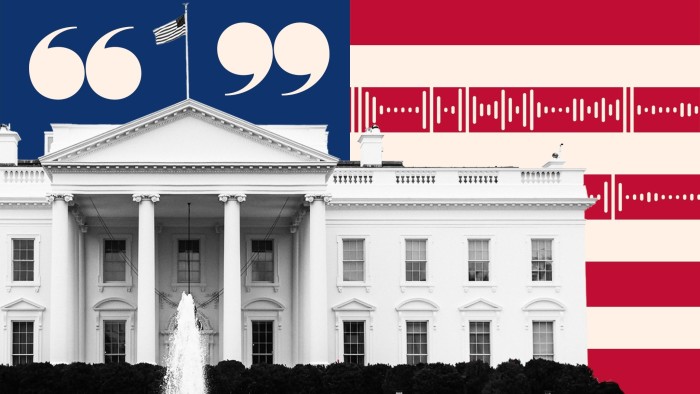US sharply raises tariffs on Chinese EVs and semiconductor imports

The stories that matter on money and politics in the race for the White House
President Joe Biden is sharply raising tariffs on Chinese imports, ranging from electric vehicles to solar cells, in a pre-election effort to protect US jobs.
The White House said $18bn of Chinese goods would be hit by the rises, which were “carefully targeted at strategic sectors” and designed to buy time for US companies to catch up with Chinese rivals in green technology.
In one of the biggest moves, the US will quadruple the tariff on Chinese EVs to 100 per cent this year.
Speaking in the White House Rose Garden in front of leaders of several US labour unions, Biden said China had engaged in “cheating” by employing unfair trade practices, including for EVs, and also with cyber espionage.
“Whether it’s gas, electric or hybrid, we’re never going to allow China to unfairly control the market for these cars — period,” the president said.
Brad Setser, a trade expert at the Council on Foreign Relations, said the tariffs were “an indication that Biden is not willing to let [China’s President] Xi Jinping hijack his plans for a made-in-America green transition”. He said the “most consequential tariff” was the higher rate for EVs.
Only 2 per cent of US imports of EVs come from China, according to the CSIS, a think-tank. But the higher tariffs are designed to make it even harder for the Asian country to gain a real foothold.
Biden is also tripling the rate on imports of steel and aluminium. The rate on Chinese chips will be doubled from 2025, and the tariff on solar cells will be doubled this year to 50 per cent.
Donald Trump, the Republican presidential candidate, accused Biden of acting too slowly and not going far enough.
“Where have they been for three-and-a-half years? They should have done it a long time ago,” Trump said. “But they’ve also got to do it on other vehicles and they have to do it on a lot of other products because China’s eating our lunch right now.”
Biden later hit back, saying he was taking a “smart approach” compared to the way Trump had handled China, saying his predecessor had done little to increase US exports and boost domestic manufacturing. “He did neither, he failed.”
China’s foreign ministry said Beijing “opposes unilateral tariff increases that violate World Trade Organization rules and will take all necessary measures to safeguard its legitimate rights and interests”.
Have your say

Joe Biden vs Donald Trump: tell us how the 2024 US election will affect you
Washington will also more than triple tariffs on Chinese lithium-ion EV batteries to 25 per cent this year. It will take a similar action for lithium-ion batteries for non-electric vehicles from 2026 — a move officials said was designed to give US companies more time to develop the technology.
Senior US officials denied the shift was connected to the presidential election. “This has nothing to do with politics,” one official said.
Biden has taken actions in recent months that are designed to shore up votes among union workers ahead of November’s election.
The US officials said many of the sectors targeted were the same clean energy areas that Biden had prioritised for development through legislation including the Chips Act and the Inflation Reduction Act.
One official said the US was not trying to “undercut” China’s development or hurt efforts that Washington and Beijing had taken to stabilise relations since Biden met Xi for a summit in November.
Greta Peisch, who until recently served as general counsel in the Office of the US Trade Representative, said raising tariffs on the vehicles was important for US industry.
“Having our companies know their investments are not going to be undermined by an influx of imports from China in one or two or however many years is really important,” said Peisch, who is now at the law firm Wiley.
The United Steelworkers union welcomed the tariffs. “Flawed Chinese trade policies have had an outsized negative impact on our members,” said David McCall, the union’s international president.
But business groups voiced concern, noting Biden did not lower or remove any tariffs introduced during the previous Trump administration.
Craig Allen, president of the US-China Business Council, said: “We are disappointed with the outcome because maintenance of the prior tariffs — with no reductions — and imposition of additional tariffs ultimately make it harder for American companies to compete in the US and abroad.”
Germany’s Chancellor Olaf Scholz pointed out that at least 50 per cent of EV exports from China came from western brands that have factories in the country.
“European manufacturers and some American ones are successful in the Chinese market and also sell a great many vehicles that are produced in Europe to China,” he said.
However, the European Commission is also investigating EV imports from China and is expected to increase tariffs in the coming months.
Additional reporting by Joe Miller in New York, Kana Inagaki in Tokyo, Wenjie Ding in Beijing, Gloria Li in Hong Kong and Arjun Neil Alim in Frankfurt
Comments